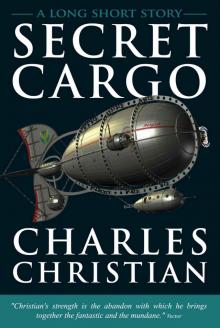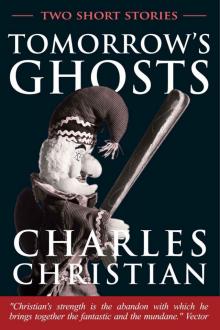- Home
- Charles Christian
Secret Cargo Page 4
Secret Cargo Read online
Page 4
“You are normal,” I reply. “It’s just the rest of the universe that is abnormal. But that doesn’t matter any more because we have our own private world.”
Perhaps it is the alcohol. Perhaps it’s the desperateness of our situation or just destiny. Slowly and tenderly we undress each other and then, not without some awkwardness, ambivalence and uncertainty about our respective roles, we make love.
8. The Crimson Pirate
The next morning sees the dawning of a beautiful day, with the two suns shining brightly in a clear blue sky and waves from the wine-dark ocean breaking gently upon the shingle shore. I’ve a feeling this is going to be a momentous day so I pull out my genuine 21st century vintage Moleskine notebook from the small cache of personal belongings I was able to grab when the starship exploded and begin to write up the events of the last few weeks and my encounters with Meredith. Meredith who turned out to be not that kind of woman at all.
As I open the notebook’s black cover and start jotting down my thoughts, I think back on all the other people who, down the centuries, have found themselves capturing their ideas and experiences in unusual places. Ernest Hemingway on Mount Kilimanjaro. Bruce Chatwin in the Australian Outback. And my own personal hero, the great Roscoe Sterling, the last surviving member of the first Mars expedition, scribbling out his final observations atop Olympus Mons before his oxygen supply ran out.
I shake my head. No, those are not good role models as all three of them died prematurely. I’m stirred from my thoughts by the sound of Meredith’s voice “Hey, look at what I see,” I hear her shout. “Look who is coming home to Mummy and Daddy.”
I glance up and there is the scuttler we sent off to investigate the mushroom trees yesterday, returning to camp with a large piece of fungoid matter clutched in one of its claw-like pincers.
The scuttler makes its way over to the AI terminal on the container and begins to sync data. We are not privy to the conversation but we can see something is happening by the way its eyes flash in different colours as it communicates with the AI. First flashing red interspersed with blue. Then amber. And finally green.
As the scuttler moves away to find some direct exposure to the suns, so it can recharge its solar power cells, the AI’s monitor screen flashes up a new status report:
STATUS UPDATE 2148: FUNGOID MATERIAL CAN BE HARVESTED FOR CONSUMPTION
“Did you see that?” shouts Meredith. “We can eat this stuff. It may not be as good as a risotto from Old London Town but at least it will keep us alive. Let’s break out some of the chocolate and celebrate.”
I laugh. When I boarded that starship I had no idea that just a few weeks later I’d be stranded on this planet playing house with Meredith, though I’m not quite sure which one of us is Father and which is one of us is Mother. But I don’t care, for the first time in many years I am truly happy.
“You know,” I call out to Meredith, “all we’ve got to do now is persuade the AI to find a way to get off this planet and everything will be perfect.”
With hindsight I can see that sometimes you should be careful what you wish for.
Meredith and I become the lotus eaters. We eat. We drink. We swim in the ocean. We spend hours talking about nothing or else, holding hands, we go for long walks along the shore. And we explore our new-found, if still confused, sexuality.
All the while this is going on, I’m aware that our AI, Jules Verne, has become the focal point for a flurry of activity and industry. It starts with the AI booting-up all the other scuttlers in the concealed cargo compartment. I confess I’m more than a little unsettled to see them using their claw-like pincers to cut their way out of their own packaging and then climb into the open, like a tide of migrating land-crabs.
Next, the AI begins marshalling the scuttlers to analyse and pool the resources at its disposal. Our escape pod and its remaining fuel cells. The fabric from the drogue parachutes. The autonomous container transporter and its rocket motors. The container’s cargo, particularly the alcohol. The ornate brass and wood barrelling of the inner container. And of course the scuttlers themselves, who, although we don’t appreciate it at first, have also been charged by Jules Verne with the task of investigating the microbiology of the nearby forest of mushroom trees.
Soon, the rocket motors and fuel cells are being disassembled and reconfigured. The wooden staving is sawn and refashioned. The parachutes are cut and resewn. Experiments with synthesised ethanol fuel explode into life with increasing regularity. Balloon lifting gases are distilled. The mycelium of the mushroom forest is processed and fabricated into an organic Styrofoam.
Over a period of days, with the scuttlers working around the clock (although I must admit that, thanks to the twin suns, I struggle to calculate the average duration of a day on this planet) a new structure begins to take shape. With its polished woodwork it looks like a cross between a galleon sailing ship, from the Spanish Main of Old Earth pirate movies, and a flying machine from a fantasy novel, complete with ethanol-fuelled rocket engines, a gas balloon and wings fabricated from the mushroom Styrofoam.
“I can finally see now why they named our AI Jules Verne,” I say to Meredith. “This construction is so much like something out of one of the real Verne’s novels. I’m not sure what to expect next. Kirk Douglas and James Mason walking into shot, dressed for their parts in Twenty Thousand Leagues Under the Sea or David Niven in Around the World in Eighty Days.”
“More like Dick van Dyke from Chitty Chitty Bang Bang,” replies Meredith, “though of course that was Ian Fleming rather than Jules Verne. But in that case, which of us is playing Caractacus Potts and who gets to be – or have – Miss Truly Scrumptious?”
“Good question although now I look at the craft, I can’t help noticing that there doesn’t seem to be much room for either us or any form of life support.”
“Oh don’t go being such a silly worrypuss,” says Meredith. “The AI knows perfectly well what it is doing. It ought to do, it’s smarter than us! Add that to its prime directive of delivering the cargo and it is going to be doing its damnedest to get itself out of this place. Besides, it has our best interests at heart – remember the Asimov Laws! Look, one of the scuttlers came back to camp earlier today bringing some really succulent pieces of mushroomy stuff. I’ve poached them in port wine, they smell delicious. Truly Scrumptious in fact!”
And she is right. They do smell and taste delicious.
Much later that evening, as we watch one of the suns set over the ocean, I find myself mulling over the latest turn of events. “Listen,” I say to Meredith, who is resting her head on my shoulder, “if this craft the AI is constructing is really meant to carry us, there has to be some kind of accommodation capsule otherwise we won’t survive the thin air and sub-zero temperatures of the upper atmosphere, never mind the vacuum of outer space if we head off-planet.
“Do you recall what you said when we first encountered the scuttlers? About the rumours of them being illegally fitted with artificial intelligence? Look at this lot,” I say as I twist round to peer at the craft and am greeted by a sea of flickering pairs of blue eyes staring back at me in the twilight. “When you get a bunch of AI units syncing up with each other, isn’t there some kind of phenomenon – a hive mind or swarm intelligence – that amplifies their processing power? Maybe that’s what happening here?
“Our AI’s namesake back in the nineteenth century was a writer of fantasy stories and I don’t think this iteration of Jules Verne has an any more closer grip on reality! This flying galleon they are building reminds me uncomfortably of Verne’s creations. In fact I think our Jules Verne took a distinct dislike to us when we cut our way into that secret compartment and then used some of the timber to build our camp fire. Or do you think I’m being paranoid, Meredith?”
But Meredith doesn’t answer.
“Meredith!” A cold shiver runs down my spine as I realise she is no longer resting her head on my shoulder but is now slumped against me: an unconscious dea
d-weight. I examine her carefully. She is still breathing but she has fallen into a trance or coma. Perhaps some of the medical stuff in the tent will help?
As tenderly and gently as I can, I lay Meredith down, flat along the ground. As I do, I notice her eyes are both still wide open. Something impels me to kiss her on the lips and it’s then I notice her pupils briefly dilate and tears start to form and trickle down her cheeks. I have to get to the medical kit but when I try to stand up, nausea overwhelms me. I must get to the tent but first I need to lie down. Just for a moment. Just until this feeling of sickness passes. Perhaps if I close my eyes for a few minutes...
When I open them again, it is in the full light of day. I’m still lying on the ground next to Meredith and I’m aware I’m holding her hand. But when I try to move my hand and flex my fingers, nothing happens. I try to open my mouth to call out for assistance but my lips move soundlessly. Save for my sight, my hearing and my ability to breathe, I’m paralysed. It must have been the mushrooms Meredith cooked for us last night!
I hear a commotion in the background and then, out of the corner of my eye, I spot a scuttler hurry past me clutching something black and flapping in its pincers. It is my notebook, its cover and pages rustling in the breeze. I try to see where the scuttler is heading but it is soon out of my field of vision.
Seconds, maybe minutes, maybe hours pass by as I lie there on the shore, frozen in helpless inactivity with only my increasingly desperate thoughts and imaginings to remind me I am still alive.
Meredith said only yesterday the AI was smarter than us. She may have been joking but she was correct. The AI is not only smarter but it also has its own agenda. Like us, it wants to get off this planet. But it also knows not having two fragile human beings aboard will allow it to build to a radically stripped down and far more efficient design.
But Asimov’s Laws! An AI is not supposed to lie to human beings yet this AI and its scuttler allies lied about the mushroom trees. How could they say the mushrooms could be eaten when they knew they were toxic?
Then, with a hideous sinking feeling, I recognise my error. The machines didn’t lie to me. They answered my questions truthfully but only in a strictly literal way. I was the one at fault for not framing them more succinctly. I asked could the mushroom trees be eaten and the AI reported back that they could be harvested for consumption. The question I should have asked was were they safe for humans to eat!
The sky darkens. For a moment I think this must be the beginning of the end for me but then I realise something airborne is casting a long shadow over the ground. I shift my gaze and see it.
With the scuttlers clinging to the rigging, like a crew of buccaneers in the old Burt Lancaster movie The Crimson Pirate, the AI’s flying galleon is rising from the surface and starting to gain height. Up and up it climbs until, with a series of bangs, the alcohol-fuelled rocket motors back-fire into life and the craft accelerates away into the distance.
Lying there, my fingers still clinging uselessly to Meredith’s hand, I watch the AI ship’s parting shape until it finally vanishes from my sight.
And then we are alone.
Also by Charles Christian
The Hot Chick & Other Weird Tales
A bumper collection of 13 sci-fi, urban and dark fantasy short stories set in the present day or very near future that give everyday existence a nudge into the realms of the fantastic, the weird, the supernatural, the horrific and the surreal.
These are stories where a casual sexual encounter can embroil a person in dangerous liaisons with ghosts, aliens or even vengeful gods. Yet also where the bizarre can be found lurking just around the corner, across a cup of cooling mocha in a coffee shop, over a glass of chilled rose wine in a beach side cafe in the Cote d’Azur or in the next message on your mobile phone.
The book has been compared to stories by Brian Aldis (60’s), Keith Roberts (Chalk Giants), Fritz Leiber (Our Lady of Darkness), Philip Jose Farmer, Kuttner, Sheckley, Ellison and a Pan Horror Anthology. Many stories are familiar tropes given a reworking, some more slipstream, with a keen observation of human foibles thrown in. There are dark creepy tales, conspiracy theories a la X-Files, murder, sexual encounters, bleak space exploration romps, a pulp action story, explosions and foiled suicide attempts.
Review extracts:
“.... delivers the goods....”
“....buckets of wry humour....”
“.....smooth and elegant.”
“....style is spare and urgent...”
“....in a nutshell, the man can write.”
Some of these stories were previously published in print only as “This is the Quickest Way Down” by Salt Publishing.
http://www.amazon.co.uk/dp/B00PCWBI0C
http://www.amazon.com/dp/B00PCWBI0C
Tomorrow’s Ghosts
Alexis Byter’s job is never dull. After all, he is an expert on the paranormal.
But a routine visit from the local lady vicar starts a relationship and a sequence of events that takes the modern-day ghost hunter to almost the end of the world.
The past is interchangeable with the present and both might just predict the future if Alexis can read the clues. Its just that the clues involve a sailor from Biblical times washed up on England’s east coast, Punch and Judy puppets and a lascivious ghost. Oh, and a VW Beetle.
Buy from Amazon.co.uk
Buy from Amazon.com
Writing Genre Fiction: Creating Imaginary Worlds - The 12 Rules
Do you write genre fiction? Or love reading it? This book reveals the 12 rules that writers of sci fi, fantasy, crime and horror must never break when building believable imaginary worlds for their readers.
Can you spot the writers in love with their ‘trappings’ (showing off their research), ever been let down by an author ‘cheating’ (called ‘jumping the shark’), are you in danger of losing the (credible) plot? The 12 Rules also covers gadgets vs. characters, plausible villains, unspeakable names, language and more.
If you are writing genre fiction, The 12 Rules keep your readers reading. As a reader, armed with this guide, have some fun spotting any rule transgressions in your next book.
www.amazon.co.uk/dp/B00MELTC84
www.amazon.com/dp/B00MELTC84
DO YOU WANT MORE SFF & H?
Bookmark this site: SciFi-and-Fantasy.land
Sci fi, fantasy, paranormal and horror content, free fiction, regularly updated with news, images, ideas, apparitions, weird stuff and now showcasing selected fresh SF&F fiction and poetry.
There are paid opportunities for selected submissions - contact Charles Christian for more details:
[email protected]
www.facebook.com/charles.christian
www.twitter.com/ChristianUncut
www.uk.linkedin.com/in/charleschristian
www.plus.google.com
Before you go Dear Reader
I know you are really busy but I need your help. We authors actually do sit alone in our garrets scribbling away so we absolutely love to hear from our readers. I'd like to know what you thought of Secret Cargo.
The next page coming up will let you leave a review. If you could spare a few minutes to give me your thoughts I will bear them in mind for my next book and be very grateful you took the time! It really is genuinely appreciated.
Charles Christian

 Secret Cargo
Secret Cargo Tomorrow's Ghosts
Tomorrow's Ghosts The Hot Chick & Other Weird Tales
The Hot Chick & Other Weird Tales